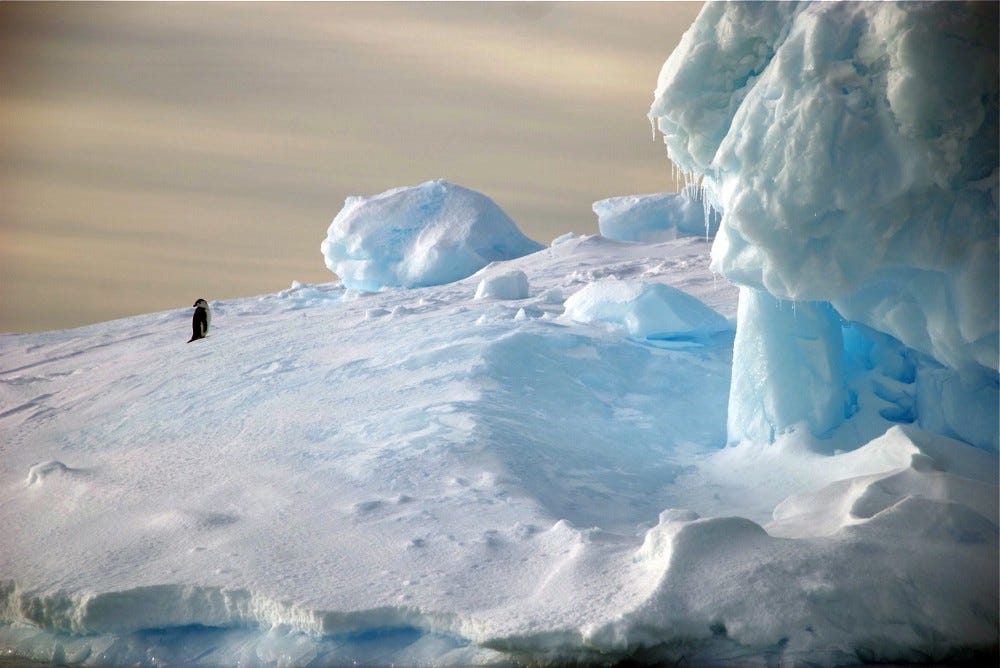
A chinstrap penguin surveys his domain near the shore of the Antarctic Peninsula. Some penguin species have already been displaced by the decline of ice in the region, and many populations will lose habitat in the decades ahead. (Photo: Bob Berwyn)
Stories not to miss from our environmental coverage over the past year...
I think we can all agree, things really went off the rails in 2016.
Environmentally, it was a year of extremes. It is more likely than not to be the hottest year on record, and yet, global fossil fuel emissions flattened. Wildfires torched tens of thousands of acres across the United States in one of the longest and largest fire seasons on record, and the Paris Agreement entered into force. Storms that should only happen every 500 years became increasingly common, and the Army Corps of Engineers denied permits for the Dakota Access pipeline pending a thorough environmental impact study. A noxious bacterium re-emerged from thawing permafrost, and, oh yeah, Americans elected a climate denier into their country’s highest office.
It is becoming increasingly clear that this planet is rapidly approaching a tipping point. “If we lose this moment for action, there’s no speech decades from now that will put these massive ice sheets back together,” Secretary of State John Kerry said at COP22 this year in Marrakech. “There’s no magic wand in any capital in the world that you can wave to refill all of the lakes and rivers that will dry up, or make farm — arid farm land fertile again. And we certainly won’t have the power to hold back rising tides as they encroach on our shores. So we have to get this right, and we have to get it right now.”
Kerry’s message underscores an important point: Environmental issues are human issues. This planet, our home, is the only one we’ve got. Caring for the Earth is caring for the communities that live there, and Pacific Standard’s environmental stories this year speak to the deeply personal nature of climate change and environmental justice, from the crabbers who first sounded the alarm on our changing oceans, to the mother who observed both Colorado’s climate and her own mind become increasingly erratic, to the one, “articulate, informed, polite” man with the weight of the world on his shoulders.
“This was the singular most powerful, most important climate event in human history. It allowed us to flourish. But we don’t know why that happened.”
- “Fed Up,” photographs by Mishka Henner
“As for the cows, it would be anthropomorphizing to assume that they abhor standing haunch-to-haunch in each other’s manure all day, passing antibiotic-resistant infections to each other while subsisting on a diet they were never meant to eat. But it’s a distinct possibility.”
“It was crabbers who first reported something amiss. In 2002, they began pulling in traps full of corpses. And they mentioned something else: Little octopuses had followed their crab lines to the surface, as if fleeing inhospitable conditions below.”
- “Droughtlandia,” by Jeremy Miller
“People are wondering, ‘What are we going to do when all the climate refugees start pouring in?’”
- “Conflagrations,” by Amy Irvine
“One minute, drab skies hurled galvanized sheets of freezing rain. The next, a blinding white sun scorched the ground. Hard winds gnashed at our aspen saplings — bending the trees to the earth like supplicants, their new leaves so dry they curled like paper held to a flame. Seismic activity increased — small but noticeable tremors in an otherwise stable landscape. Then a rash of small brushfires erupted. Things trembled and burned all around.”
“For decades, farmers tried to drill their way out of the problem. When water tables sank and wells failed, they simply dug deeper or dug elsewhere. But now, in some parts of the system, farmers have depleted the groundwater all the way down to the bedrock. And the recharge rate is so slow in some of these places that the aquifer won’t refill for thousands of years. For all intents and purposes, that water is never coming back.”
“This exclusionary principle ended up forming the backbone of the conservation movement and led to its central irony: The wild had to be kept as free of people as possible — until the right kind of white man needed to go hunting.”
“Today many Africans have woken up horrified that we have a man in the White House who does not even accept that climate change is real; a president who has promised to back more fossil fuels, and who has promised to pull out of the Paris Agreement. This means that people on this continent will pay with their lives for the results of this election.”
“Welcome to the House Science Committee’s hearings on global climate talks, where the entire world gets one guy — albeit a very articulate, informed, polite guy — to testify on its behalf.”
“We allow the same companies that continue to commit ecocide to sit at the table that decides what climate justice means to us.”
“The cryosphere isn’t just some distant abstract place. If you live outside the planet’s tropics or hot desert belts, it extends, at least seasonally, into your backyard.”
“Even at her fiercest, mother nature is no match for the need to maintain the narrative that supports our world view.”
To help do something about the climate change and global warming emergency, click here.
Sign up for our free Global Warming Blog by clicking here. (In your email, you will receive critical news, research, and the warning signs for the next global warming disaster.)
To share this blog post: Go to the Share button to the left below.

Be the first to comment
Sign in with